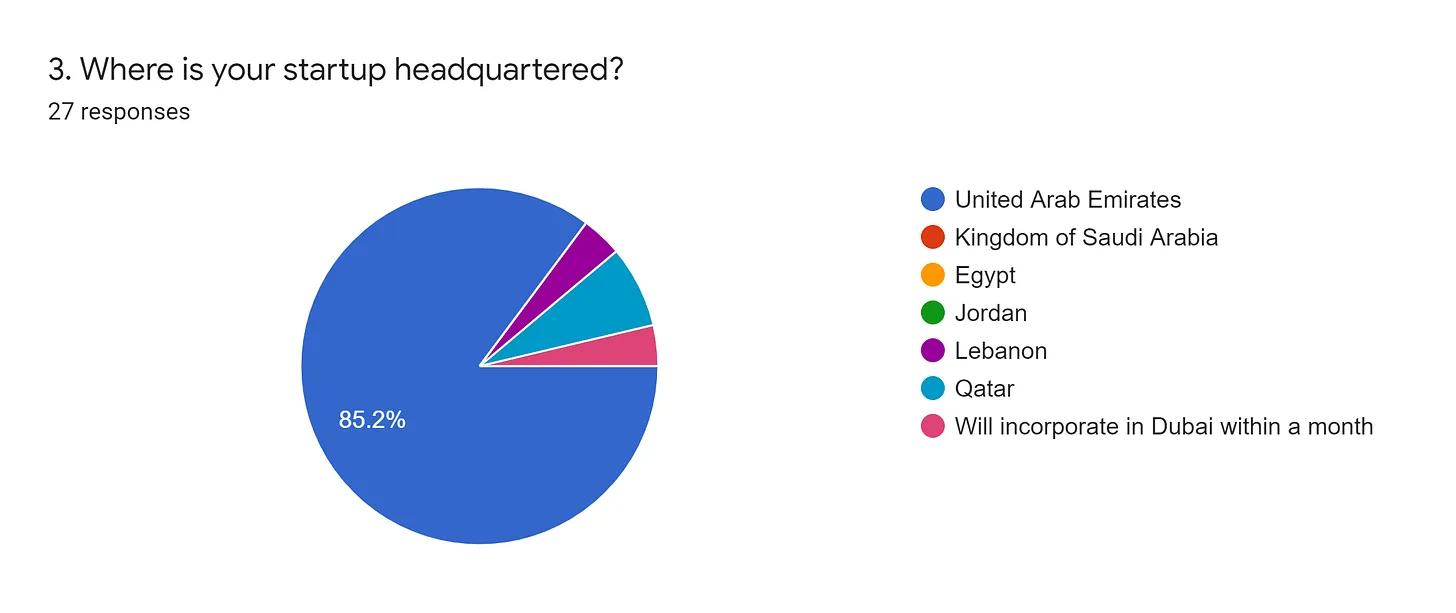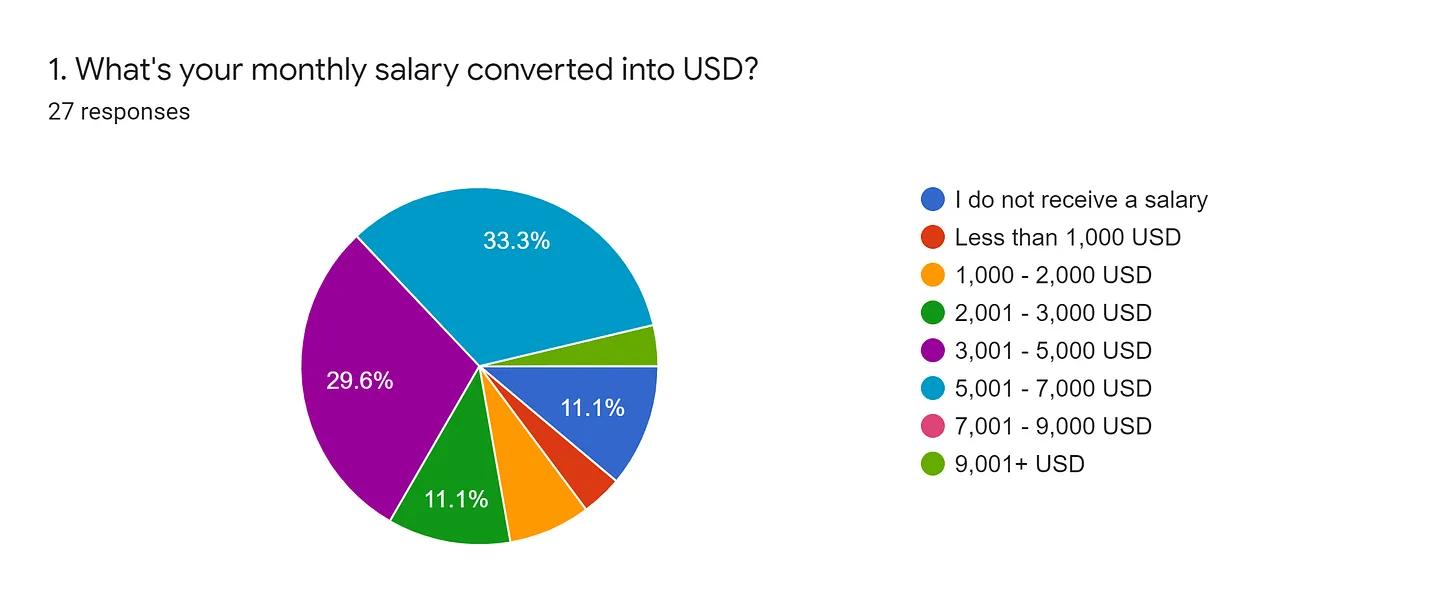Let's talk about startup salaries
July 12, 2021

About a month ago, I posted a survey on LinkedIn asking people in my network to anonymously share their salaries, roles, seniority, geography, and company funding stage. I thought I’d end up with at least 50 respondents, but the survey concluded with just 27. I shouldn’t have been surprised, as this small data set was admittedly restricted to people within my network. I mean, I’m just some guy. I’m not exactly Nielsen over here.
To make matters worse, more than 85% of the respondents were based in the UAE, so any plan to study startup compensations within the wider MENA region was out of the question. On the bright side, if we assume that the 27 who responded were from 27 different startups, we may have a somewhat decent data set.

If we wanted the real data, we’d have to consult recruiters and VCs, who have mountains of startup data in isolated silos - both in terms of salaries and employee stock ownership plans (ESOPs). This info is unlikely to be shared by either type of entity, because its a conflict of interest for recruiters, and an edge against other competitors for VCs.
Here’s what I can tell you: more than half the startups that responded were at idea/seed stage, and the remainder was split evenly between series A and B.
The largest chunk of respondents were people who had 1 to 3 years of experience. This could be due to corporate jobs demanding too many years of experience, pushing the younger professionals to the higher risk/higher reward startup ecosystem.
Perhaps someone can be motivated by my results to build a Glassdoor for the Middle East, or even go as far as building a platform to standardize everything about startups in the MENA region from employee compensation to investor term sheets, in a Y Combinator-like fashion. But I digress, so let’s just see what we can do with the responses we have at hand anyway.
Salary breakdown:

A third of those surveyed responded that they’re paid at least 5,000 USD to 7,000 per month. It’s important to note that most of the respondents earning 5,000 USD or more work in series A and series B companies. The only exception was for a few founders who reported being in this income bracket while still in the seed stage.
While this data is not remotely representative - for example, I’ve only received two answers for tech roles - the highest paid respondents worked in tech, legal, and marketing, while the lowest salary to years of experience ratio was for people who worked in business development, sales, and customer support. This seems reasonable given the the supply and demand imbalance for good developers and performance marketers in the region.
A (now archived) survey conducted by Gulf Business in 2016 showcased a serious salary discrepancy based on nationality. For the same senior management roles, the salaries were ranked in the below descending order:
- GCC National
- Western
- Arab
- South East Asian
If you’ve been in the GCC long enough, you shouldn’t be surprised about the above. What you should be surprised about, though, was that most of my survey’s respondents didn’t believe their startups gave an unfair salary advantage based on nationality. More interestingly, the overwhelming majority did not find that pay varied based on gender.
Are millennials disrupting wage discrepancy in the UAE? Are startups just a better alternative to working for an incumbent institution? Should you quit your cushy job tomorrow morning?
No.
Only half of those who answered said they like their company culture and 30% said they have extremely poor/no health insurance. In fact, if you take your average UAE recruitment company’s salary reports, startups who’ve only raised series A or less will almost always underpay their established corporate counterparties. There is, however, a catch…
Employee stock ownership plan (ESOP)
This is probably one of the sexiest things about working for a startup. If you’re not familiar with what ESOP is, then click here for a primer.
Unfortunately, very few of the respondents answered that they actually have ESOP, and even fewer confirmed that they know how much their ESOP is worth.
As the MENA startups raise more funds, I predict the below three changes:
Startups will begin giving more ESOP. As competition over good talent gets more aggressive, employees will be more aware of what they are worth, and they’ll want ESOP to match their skin in the game.
Salaries in startups will slowly match those of corporate jobs, and potentially even surpass them.
Company culture will become much more important as a deciding factor. Will you let me work from home? Will you pay for my courses? Do you care about me as an individual? If you as a founder reading this cannot honestly and immediately answer those questions, then you should be worried.
Our responsibility as founders
LinkedIn is littered with tales about founders conquering impossible situations time and time again. Filter through all the quotable platitudes about the mental strain and difficult decisions of founders and ask yourself: where is the founder without his team?
We must become less selfish. To grow and nurture the MENA ecosystem, we must focus more on our colleagues and empower them. They also go through mental strain, make difficult decisions, and sacrifice the relative safety net of corporate jobs in incumbent institutions.
It’s therefore our responsibility as founders to be more transparent about salaries, ESOP, and actual company values.
Does your company have a clear and transparent compensation philosophy? Do your colleagues know their career path should they stay with you? Do they know the salary bands of roles above them and below them?
If the answer to the above is no, that’s alright - for now. You don’t have to be a market leader in compensation transparency if you’re still in the seed/idea stage. The cool thing is that you as a founder can make the executive decision and prioritize fixing this.
For example, if you can’t pay a senior developer the going market rate salary because you haven’t closed a round yet, that’s alright. Make up for that difference in ESOP.
Check your salary register. Experience and roles aside, are you paying your male and female colleagues equally? If not, consider making up the difference in ESOP for now until you can close out that round.
We worry too much about dilution. Who cares if you own 90% of a 1 million dollar company when you can instead own 15% of a 50 million dollar company? Why settle for a corner shop when you can build the hypermarket of startups? Imagine how you’d feel knowing you’ve cultivated a company culture that raises an army of tech-savvy entrepreneurs, who then go on and start their own thing.

Founders behave like they’re Smaug from the Hobbit when it comes to ESOP.
Here’s the beauty of capitalism: even if your motives are purely financial, you’ll find that employee churn will drop significantly if you compensate them well.
Founders who refuse to pay for their teams’ certificates and further education worry about “what if we pay for their education and they leave?”.
Ask yourself instead “what if we don’t and they stay”.
You are responsible for your team’s well being and professional development. The joy of helping people develop professionally is just as rewarding as of that for closing a round.